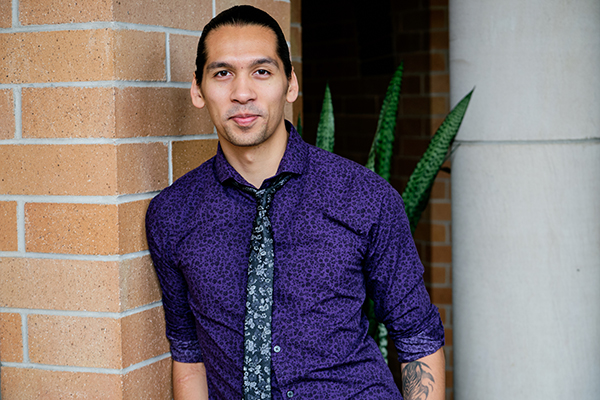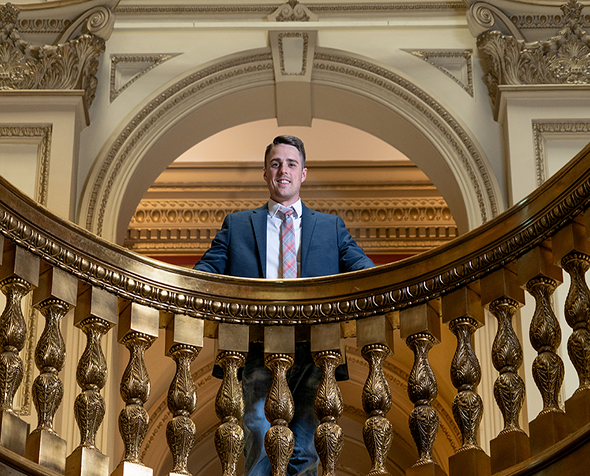Economics Master's Student Uses Listening to Drive Social Change
Zach Thanasilangkul's work reaches beyond economic and philosophical theories of subject formation. Though his passions include social and racial justice issues, it's not enough, he says, to study inequalities as concepts.
"I want to expand our imagination as a society," says Zach Thanasilangkul, an economics master's student graduating this summer, "to get people to open up and dream something bigger than what they're used to."
Growing up, Thanasilangkul didn't witness many people doing what they enjoyed. While at DU, he's explored the historical conditions and philosophical theories underpinning our ideas about community. His aim is to better understand actionable steps toward lifting marginalized communities out of oppression and poverty.
Thanasilangkul's work reaches beyond economic and philosophical theories of subject formation. Though his passions include social and racial justice issues, it's not enough, he says, to study inequalities as concepts. "I want individual stories where I can piece together themes of what a community is feeling. I view my work as contributing to conversations around community wealth by starting to talk to people."
Thanasilangkul is a Barton Institute CiviCO Social Enterprise Fellow, where he works with Aurora's Mile High Workshop, a nonprofit program that offers transitional employment for individuals coming out of homelessness, addiction, and incarceration.
"People say cooperatives improve people's lives by making them feel a sense of community, but no one ever talks to the workers." Much of the academic work surrounding this issue is limited by a lack of listening to real people's stories, Thanasilangkul explains. "What I want to accomplish through this project is learning how to listen."
By giving individuals the opportunity to tell their story, and the stories of their communities, Thanasilangkul can connect academic pursuits to lived experience. "What are people feeling, are they fulfilled?" he asks. "If they are, let's do some more of it. If not, then let's do something else."
While earning his master's, Thanasilangkul has had to apply these same questions to himself. Though he's always been invested in economic education — including involvement in creating Understory, a subsistence kitchen and community center promoting cooperation and solidarity in rural Illinois — graduate school wasn't necessarily his dream.
Thanasilangkul describes grad school as a necessary "leap of faith" that he need to take in order to pursue a career in teaching at the university level. "I was familiar with my advisor, Robert Urquhart's, work on individualism and economics. I moved a thousand miles across the country to study with him."
But it hasn't been an easy journey. "There have been times when I started to fill out the paperwork to drop out," Thanasilangkul explains. "I'm still here because the faculty not only supported me as a student doing a project, but as a person who wants to change the world."
It was the faculty's ability to listen to his story and respond to him as an individual that encouraged Thanasilangkul to pursue his research and complete his degree. Thanasilangkul recognizes racial inequality as a systemic and institutional issue, but he doesn't plan to turn his back on academia in response. Instead, he says, "It's up to me to change that image, so that more people like me can come in and say 'we do need to pay attention to these people, these issues.' 'We need to listen.'"
When he moved to Denver and began his studies at DU, Thanasilangkul helped start the Asian American Solidarity Collective alongside people from within and outside the University system. This organization "focuses on political action, community building, and identity reflection."
Thanasilangkul sees this work as one important step towards addressing larger questions about the function of the University itself. He asks, "In a place that's supposed to produce knowledge and be an anchor in the community, how do we ensure that we are being inclusive? That we are caring and listening?"
He points to the growing efforts of the Barton Institute, grassroots student organizations, and the support of faculty like the mentors he found in his own department. "There is a movement growing where we are going to be so much more than just a slogan or a catch phrase. There are a lot of people working to make that happen and to tackle those issues."
As a first-generation undergraduate and graduate student, Thanasilangkul explains that he didn't have a point of reference for his academic experiences. "Academia can be a really lonely place for anyone, for everyone. To be honest, I haven't felt like I've mattered to a lot of people, but at DU it was different. I wasn't just treated like a student, but as a world-changer. That's special."
Connecting in-classroom study to real-world experience is what has made the difference for Thanasilangkul. "Being able to publish, to present at conferences, to get hands-on experience in a social enterprise through the Barton Institute, and to get a grant to travel for research, makes me feel on track to be someone who can accomplish what they've set out to accomplish."
To this end, Thanasilangkul says if you're going to pursue grad school, "Come in with a vision." Even if it isn't a strong vision, or a vision you sustain, "Come in remembering why you are doing this: How do you want to change the world? What kind of stories do you want to tell about yourself and the world you want to live in?"
Finding communities that support the pursuit of these goals is crucial to achieving them. "When moments of connection happen, they're meaningful because they're your chances to renew yourself, replant yourself, and remind yourself what made you excited about coming here in the first place."
Reflecting on his time at DU, Thanasilangkul says, "It seems easy to pass a couple of classes, write a thesis, and be on your way. I think I am getting a completely different education: I'm in the field. That matters." And it's the connectedness between the classroom, the larger DU community, and the greater Denver area that continues to drive Thanasilangkul's work.
"Trying to drive social change is difficult anywhere, but in Denver the motion is happening. The wave is still building and we're on the wave, not on the things that were left behind. We have a chance to be on the front lines, to make change by hearing people. It's up to us to know how to listen."







